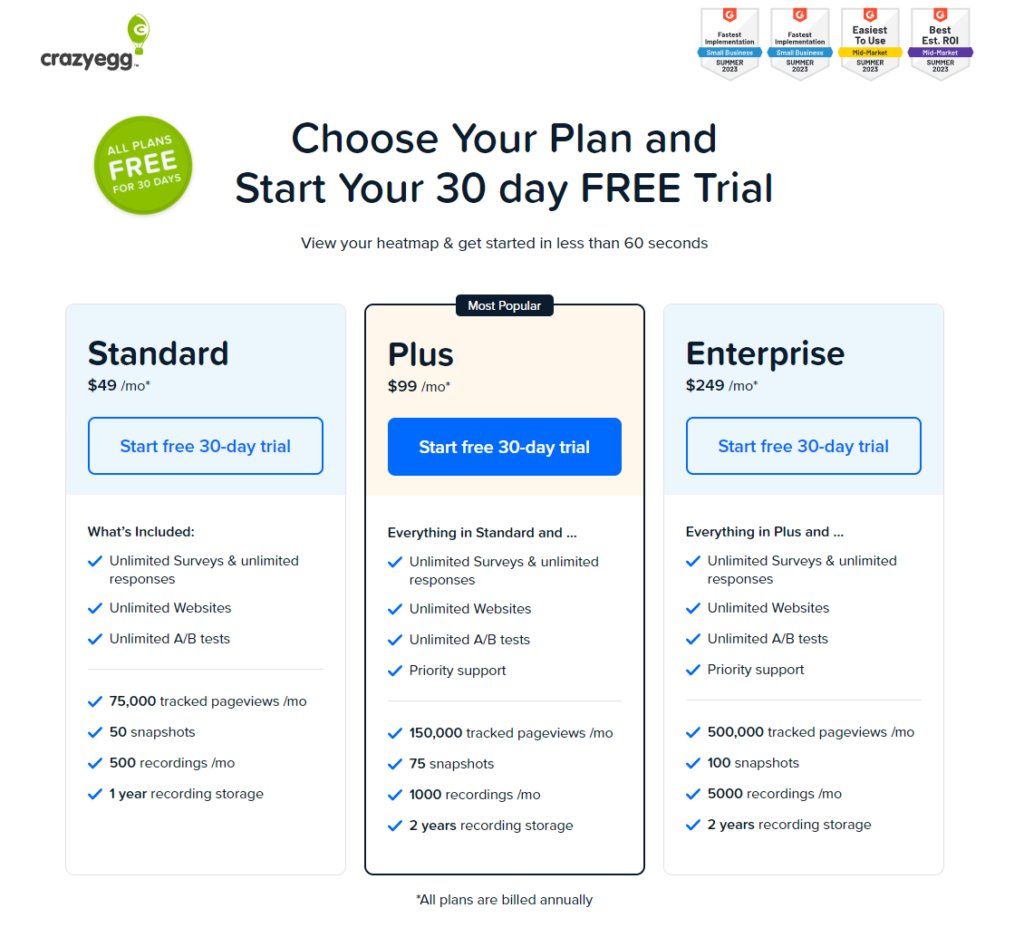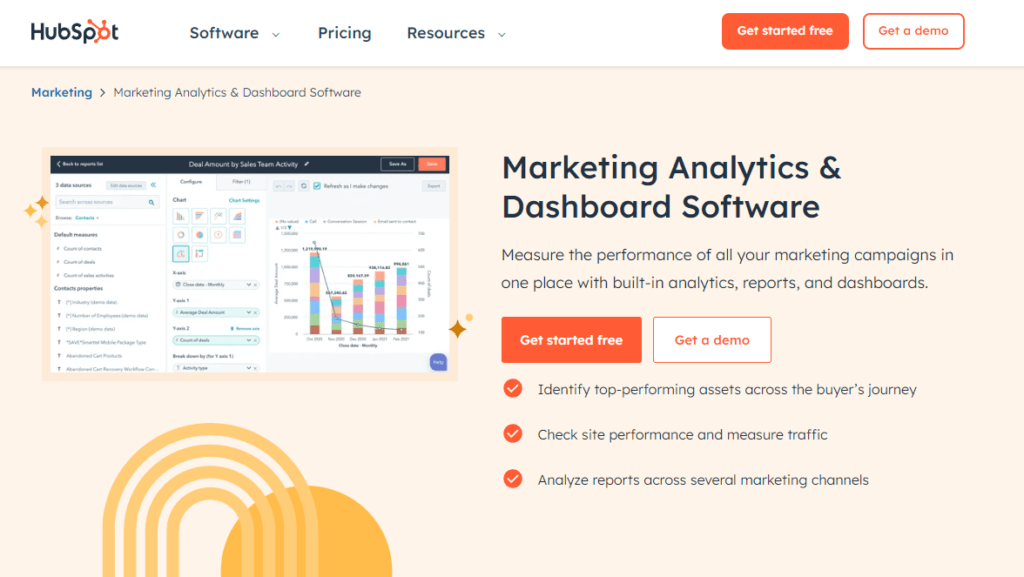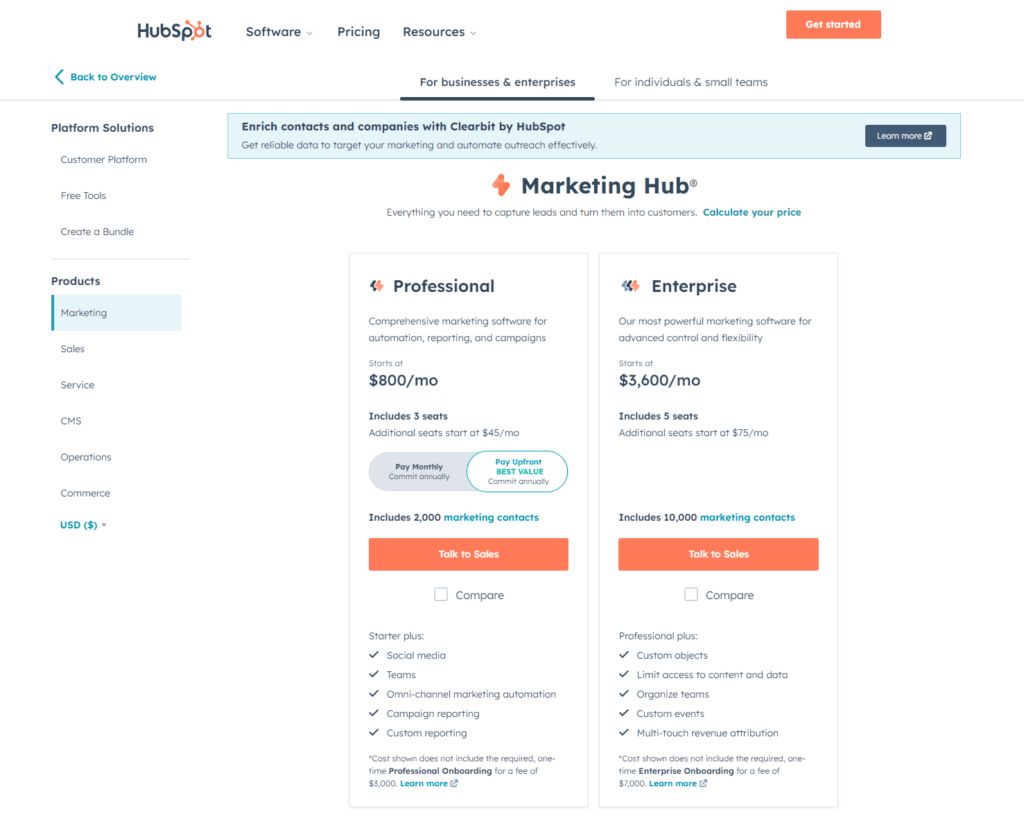In the digital marketing arena, where every click, impression, and interaction could lead to your next customer, choosing the right analytics tool is more than a decision—it’s a strategy. Today, we’re pitting two giants against each other: Crazy Egg and HubSpot Marketing Analytics. Each brings unique strengths to the table, but which one is the ace up your sleeve? Whether you’re a small business owner, a marketing professional, or just dipping your toes into the vast ocean of digital analytics, this comparison is your lighthouse. Let’s navigate through the fog of features and functionalities to discover the best analytics tool for you, starting with our first compass point: user interface and ease of use.
Crazy Egg | HubSpot Marketing Analytics |
|---|---|
| G2 Score – 4.2 out of 5 stars | G2 Score – 4.4 out of 5 stars |
| TrustRadius Score – 7.6/10 | TrustRadius Score – 8.5/10 |
User Interface and Ease of Use
In the world of digital analytics, where the treasure trove of data is as vast as it is complex, the value of simplicity cannot be overstated. A tool’s user interface (UI) is often the make-or-break factor for many users—because, let’s face it, not all of us speak fluent ‘data’. Here’s how Crazy Egg and HubSpot Marketing Analytics measure up in guiding us through their analytical landscapes with ease.
Crazy Egg:
Entering the Crazy Egg dashboard is like walking into a well-lit, neatly organized room where everything has its place. Known for its user-friendly interface, Crazy Egg makes data analytics feel less like rocket science and more like a conversation. It’s renowned for its visual analytics tools, such as heatmaps, scroll maps, and session recordings, which are not only intuitive but also incredibly insightful. These tools allow even the most non-technical of users to quickly understand what actions visitors are taking on their site and why. The simplicity of Crazy Egg’s UI democratizes data, making actionable insights accessible to all, from seasoned marketers to business owners making their first foray into the digital space.
HubSpot Marketing Analytics:
HubSpot, on the other hand, offers a suite that’s akin to a Swiss Army knife for digital marketing. Its Marketing Analytics tool is part of a larger ecosystem designed to cover every aspect of your digital marketing efforts—from email campaigns to social media management. HubSpot’s dashboard offers a comprehensive overview of your marketing performance across various channels. The learning curve can be steeper compared to Crazy Egg, given the breadth of functionalities and data points available. However, HubSpot excels in integrating analytics with actionable marketing tools, making it a powerhouse for those who wish to not only interpret data but also act on it directly from the same platform.
Integration Capabilities
In today’s digital marketing ecosystem, the ability of an analytics tool to integrate seamlessly with other platforms and services is not just an added bonus—it’s a necessity. Let’s explore how Crazy Egg and HubSpot Marketing Analytics stand up to the challenge of integration, offering a bird’s eye view on how well they play with others.
Crazy Egg:
Crazy Egg’s primary focus is on providing clear, actionable insights into user behavior on your website through its heatmap, scroll map, and session recording features. Its integration capabilities are somewhat focused, aiming to ensure that you can easily implement its tracking code across your site, regardless of the content management system (CMS) you’re using. Integrations with popular website builders and platforms like WordPress, Shopify, and Squarespace are straightforward, making it accessible to a wide range of users.
However, when it comes to CRM systems, email marketing platforms, or more extensive marketing automation tools, Crazy Egg’s integrations are not as deep. For businesses primarily focused on enhancing their website’s user experience, this level of integration may be entirely sufficient.
HubSpot Marketing Analytics:
HubSpot shines in its ability to offer a holistic view of your marketing efforts, largely due to its extensive integration capabilities. Being part of the broader HubSpot ecosystem, the Marketing Analytics tool naturally integrates deeply with other HubSpot modules, including CRM, email marketing, content management, and more. Beyond its ecosystem, HubSpot offers integrations with hundreds of third-party apps and services, from social media platforms to Google Ads and beyond.
This extensive network of integrations enables businesses to bring all their marketing data under one roof, providing a comprehensive view of their marketing performance across multiple channels and platforms.
In the area of integration capabilities, HubSpot Marketing Analytics takes the lead for businesses looking for a comprehensive, all-in-one marketing solution that can centralize data from a wide array of sources. Crazy Egg, with its focused approach, offers value to those who need detailed insights into website user behavior without the necessity for broad marketing platform integrations.

Related: Check out our free SEO suite

Data Analysis and Reporting Capabilities
The crux of any analytics tool lies in its ability to dissect vast amounts of data and present it in a way that’s both insightful and actionable. Data analysis and reporting capabilities are where the rubber meets the road, turning mere numbers into strategic directions. Let’s delve into how Crazy Egg and HubSpot Marketing Analytics stack up in translating data into decisions.
Crazy Egg:
Crazy Egg has carved its niche in providing visual analytics tools that simplify complex data sets into understandable and actionable formats. Heatmaps, scroll maps, and session recordings translate visitor behavior into visual data, allowing users to quickly pinpoint areas of their website that are performing well and those that need improvement. The platform’s reporting features are designed to be digestible, with the ability to easily share findings across teams. However, for users seeking to delve into more granular data analysis or to combine website behavior data with other marketing metrics, Crazy Egg’s reporting might seem somewhat limited. Its strengths lie in its simplicity and the immediate applicability of its insights, primarily around website optimization.
HubSpot Marketing Analytics:
In contrast, HubSpot Marketing Analytics provides a comprehensive suite of reporting tools that cater to a wide spectrum of marketing data analysis needs. From website traffic and conversion rates to email campaign performance and social media engagement, HubSpot offers detailed reports that can be customized to suit specific requirements. The platform’s strength lies in its ability to aggregate data from various channels into a unified reporting dashboard, offering a holistic view of marketing performance.
HubSpot’s analytics also extend to predictive modeling and advanced segmentation, enabling marketers to forecast trends and tailor strategies to specific audience segments. While powerful, these advanced features may require a steeper learning curve and a more substantial time investment to fully leverage.
In comparing data analysis and reporting capabilities, HubSpot Marketing Analytics offers a more robust and comprehensive solution suited for businesses that require deep dives into their marketing data across multiple channels. Crazy Egg, with its focus on visual data and website user behavior, provides an intuitive and accessible option for those prioritizing ease of use and quick insights into website optimization.
Learning Resources and Community Support
The digital marketing world is ever-evolving, with new technologies, strategies, and best practices emerging regularly. A robust analytics tool should not only provide powerful features but also ensure users have access to educational resources and a supportive community to maximize their effectiveness. Here’s how Crazy Egg and HubSpot tackle this aspect.
Crazy Egg:
Crazy Egg focuses on making analytics approachable, and this ethos extends to its learning resources. The platform offers a variety of articles, guides, and tutorials designed to help users get the most out of its features, from setting up your first heatmap to interpreting session recordings to optimize user experience. While the direct support provided is reliable, the broader Crazy Egg community is somewhat informal, scattered across various digital marketing forums and social media platforms. Users often share tips and insights, but the sense of a centralized, cohesive community might be less pronounced compared to larger, more comprehensive platforms.
HubSpot Marketing Analytics:
HubSpot excels in providing an extensive array of learning resources, backed by one of the most vibrant communities in the digital marketing space. The HubSpot Academy is a treasure trove of courses, certifications, and training materials covering a wide range of topics, not just limited to analytics but encompassing all facets of digital marketing. This educational content is designed to not only help users leverage HubSpot’s tools effectively but also to advance their overall marketing expertise.
Furthermore, the HubSpot user community is active and engaged, with forums, user groups, and regular events that bring together users from around the globe. This community support, combined with direct access to HubSpot experts and a comprehensive knowledge base, ensures users have everything they need to succeed.
In the realm of learning resources and community support, HubSpot Marketing Analytics clearly takes the lead, offering a more structured and extensive support ecosystem. Its commitment to user education and community engagement makes it an attractive option for businesses that value ongoing learning and networking opportunities. Crazy Egg, while providing solid direct support and useful learning materials, might not match the scale and scope of HubSpot’s community offerings.
Customer Segmentation and Personalization Capabilities
In the age of information overload, personalization isn’t just nice to have—it’s expected by customers. The ability of an analytics tool to slice and dice data, creating detailed customer segments for targeted marketing campaigns, is pivotal. Let’s see how Crazy Egg and HubSpot stack up in this domain.
Crazy Egg:
Crazy Egg’s forte lies in visualizing how users interact with your website, offering insights that can inform broader marketing strategies, including segmentation. While its direct segmentation capabilities might seem limited compared to full-suite marketing platforms, Crazy Egg does allow for a level of behavioral segmentation. For instance, heatmaps can show how different traffic sources behave on your site, which can indirectly inform segmentation strategies. However, Crazy Egg primarily shines in the optimization phase, making your website as engaging and effective as possible for whoever your audience might be, rather than in the deep, data-driven segmentation that feeds into personalization efforts directly.
HubSpot Marketing Analytics:
HubSpot, with its integrated CRM and marketing automation platform, naturally excels in customer segmentation and personalization. HubSpot Marketing Analytics uses detailed customer interactions and behavior data to create dynamic segments that can be used across its suite of tools for highly targeted marketing campaigns.
Whether it’s email personalization, content customization, or tailored workflows, HubSpot provides the tools to not only segment your audience with precision but also to act on those segments with personalized marketing efforts. This capability is a game-changer for businesses looking to deliver relevant, engaging content to different segments of their audience, significantly enhancing the customer experience and improving conversion rates.
In the arena of customer segmentation and personalization, HubSpot Marketing Analytics is the clear leader, thanks to its integrated approach and the breadth of data it can leverage for creating detailed customer profiles. For businesses whose strategy heavily relies on personalized marketing and deep customer segmentation, HubSpot offers a powerful, all-in-one solution.
Pricing
Crazy Egg:

HubSpot Marketing Analytics:


Conclusion
Choosing between Crazy Egg and HubSpot Marketing Analytics boils down to understanding your primary analytics goals, the depth of data integration you need, and how you plan to use the insights to drive your marketing strategies.
Crazy Egg is the go-to tool for businesses focused on optimizing their website’s user experience with straightforward, visual analytics. It excels in providing actionable insights through heatmaps, scroll maps, and session recordings, allowing you to make quick and effective changes to your website. Its simplicity and user-friendly interface make it accessible for users of all skill levels, emphasizing immediate improvements to enhance visitor engagement and conversion rates.
HubSpot Marketing Analytics, on the other hand, offers a comprehensive suite for businesses looking to dive deeper into their marketing performance across all channels. With its robust integration capabilities, detailed customer segmentation, and personalization features, HubSpot is ideal for those who seek to understand and act on their marketing data in a more integrated and nuanced way. The platform supports a holistic marketing strategy, backed by a wealth of learning resources and an active community, making it a powerful ally for businesses aiming to leverage analytics for growth.
Read Next:
- GetResponse vs Zoho Campaigns: The Best Email Marketing Tool for 2024
- AWeber vs ActiveCampaign: The Best Email Marketing Tool
- Constant Contact vs Campaigner: Best Email Marketing Tool
- GetResponse vs Omnisend: The Best Email Marketing Tool for 2024
- AWeber vs Benchmark Email: The Best Email Marketing Tool






















Comments are closed.